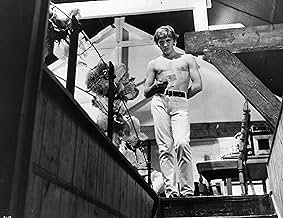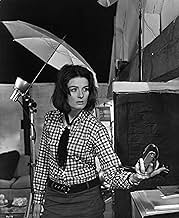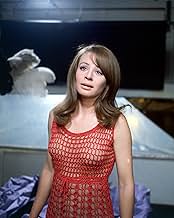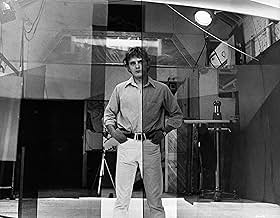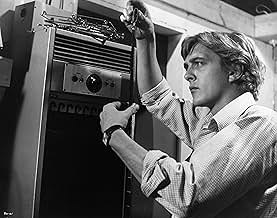Blow-Up
- 1966
- Tous publics
- 1h 51m
A fashion photographer unknowingly captures a death on film after following two lovers in a park.A fashion photographer unknowingly captures a death on film after following two lovers in a park.A fashion photographer unknowingly captures a death on film after following two lovers in a park.
- Nominated for 2 Oscars
- 8 wins & 9 nominations total
Veruschka von Lehndorff
- Verushka
- (as Verushka)
Jeff Beck
- Self - The Yardbirds
- (uncredited)
Roy Beck
- Boy dancing In Ricki Tick Club
- (uncredited)
Charlie Bird
- Homeless Man
- (uncredited)
Susan Brodrick
- Antique shop owner
- (uncredited)
Robin Burns
- Homeless Man
- (uncredited)
Tsai Chin
- Thomas's receptionist
- (uncredited)
Julio Cortázar
- Homeless Man
- (uncredited)
Chris Dreja
- Self - The Yardbirds
- (uncredited)
Featured reviews
BLOW-UP is the story of a successful fashion photographer, Thomas (David Hemmings), who, whilst scouting for fresh subjects in a park one afternoon, photographs a mysterious couple in 'flagrante delicto.' Upon returning to his studio loft later that day, he develops the pictures and discovers that he has inadvertently stumbled upon a murder. Antonioni is not interested in the details of the murder itself, as in a typical detective story, but rather with how the protagonist's perception of the world, and his relationship to it, is altered by this event.
As a fashion photographer, Thomas is a creator of illusions that define a certain kind of young urban lifestyle and Antonioni's flagrant use of the loud, splashy, attention-grabbing colors of billboard advertising -- a visual association elevated to an unholy apotheosis in his next film, ZABRISKIE POINT (1970) -- brings to the surface the transient sensation and hollow artifice that lies at the heart of all pop culture consumerism. In his previous work, RED DESERT (1964), Antonioni spray-painted both the man-made décor as well as the natural setting as a means of giving concrete expression to the heroine's neurotic state of mind and her ameliorative aestheticizing vision of a world despoiled by technology and pollution. He does the same in BLOW-UP, painting doors, fences, poles, and the façades of entire buildings to emphasize the exhilaration and alienation that characterizes life in a large modern city.
Psychedelic colors make the 'real' world of the film seem exaggerated and hyperbolic like a fantastic 'surface' reality, while the 'captured' and reconstructed world of the photographs appears ominously stark, grainy, and documentary-like -- the bare, denuded 'essence' of reality. In the central montage sequence of the film, the camera -- in place of Thomas' eyes -- slowly moves back and forth from one photograph to the next, and likewise, Antonioni cuts back and forth from the pictures to the protagonist looking at them. Since the act of looking at these enhanced images effectively reconstructs an event that the protagonist -- and the audience -- never actually saw with the naked eye in 'real life,' technology is shown to reveal a new surface of the world that is normally hidden from view. Antonioni's own particular brand of phenomenological Neorealism is concerned primarily with the process of seeing through a camera as a way of exposing an ultimate truth, or a lack thereof, that underlies the surface of the world.
The curious self-reflexivity of this scene is an epistemological hall of mirrors: Antonioni's camera looks at Thomas looking at photographs which are blown up larger and larger so that eventually they become merely an abstract collection of dots, a Rorschach test in which almost anything can be read. Like the Abstract Expressionist paintings of the tormented artist son in Pasolini's TEOREMA (1968), the received cultural baggage and semiotic referentiality of the image is eliminated until all that remains is purest subjectivity of the spectator. And so, picture-making technology mediates reality only up to a point: once the threshold of referentiality has been crossed, the suspicion of a murder in the park gleaned from a series of enlarged photographs would seem to say more about Thomas' own paranoid state of mind than what his camera may or may not have recorded.
This subtextual aspect of the film has been compared to the controversy surrounding the various interpretations of the Abraham Zapruder film as a definitive and reliable record of the Kennedy assassination -- and particularly, the mystery of the notorious 'grassy knoll.' Also, the possible incidence of adultery and The Girl's desperate efforts to retrieve the film suggest the scandalous fallout of the Profumo affair. Vanessa Redgrave, with her thick, dark brown hair and affected temptress-naïf manner, hinted at by a schoolgirl outfit and arms folded seductively over her breasts, seems meant to evoke, for a British audience at least, then-recent memories of Christine Keeler.
BLOW-UP is full of visual and verbal non-sequiturs and nearly all the scenes are composed of long-takes with plenty of 'longeurs' and 'temps mort.' This real-time approach -- often fragmented by abrupt and seemingly arbitrary cuts -- faithfully simulates Thomas' experience and the mechanical routine of his creative process and its fleeting moments of sudden inspiration and frenzied excitement. All throughout the film there is a recurrent pattern of relationships left unconsummated and work left undone. Just as he appears on the verge of establishing meaningful contact with someone or about to finally resolve himself to some efficacious deed or another, he is immediately distracted by something else that pops up.
Thomas resembles Odysseus in the way he is continually thwarted by chance encounters, which cause him to lose sight of his mission. Indeed, the film's meandering, episodic plot does seem to have elements of classical epic: the rock concert and the marijuana party afterward all suggest a ritual journey through a modern 'Land of the Lotus-Eaters.' Ironically, it is just when he discovers a sense of emotional commitment and social obligation in his life that his self-justifying cynicism and arrogant indifference toward others is replaced by a growing sense of impotence and defeat. In the final scene, speech is phased out of the film entirely, leaving only a silent form of physical communication unmediated by language and social pretensions.
BLOW-UP was the Antonioni's greatest commercial and critical triumph and the film's narrative -- an odyssey through a modern city, following the protagonist from feigned poverty to the false security of wealth and ending on a note of final lingering doubt about one's place and purpose in the world -- seems itself a trenchant comment on the nature of success and what it does to people. By transposing to 'Swinging London' the Marxist concerns of his Italian films, Antonioni demonstrates once again that this malaise of modern life is not caused by technology and consumer culture but rather by man's failure to adapt to the conditions of the new environment he has created for himself.
As a fashion photographer, Thomas is a creator of illusions that define a certain kind of young urban lifestyle and Antonioni's flagrant use of the loud, splashy, attention-grabbing colors of billboard advertising -- a visual association elevated to an unholy apotheosis in his next film, ZABRISKIE POINT (1970) -- brings to the surface the transient sensation and hollow artifice that lies at the heart of all pop culture consumerism. In his previous work, RED DESERT (1964), Antonioni spray-painted both the man-made décor as well as the natural setting as a means of giving concrete expression to the heroine's neurotic state of mind and her ameliorative aestheticizing vision of a world despoiled by technology and pollution. He does the same in BLOW-UP, painting doors, fences, poles, and the façades of entire buildings to emphasize the exhilaration and alienation that characterizes life in a large modern city.
Psychedelic colors make the 'real' world of the film seem exaggerated and hyperbolic like a fantastic 'surface' reality, while the 'captured' and reconstructed world of the photographs appears ominously stark, grainy, and documentary-like -- the bare, denuded 'essence' of reality. In the central montage sequence of the film, the camera -- in place of Thomas' eyes -- slowly moves back and forth from one photograph to the next, and likewise, Antonioni cuts back and forth from the pictures to the protagonist looking at them. Since the act of looking at these enhanced images effectively reconstructs an event that the protagonist -- and the audience -- never actually saw with the naked eye in 'real life,' technology is shown to reveal a new surface of the world that is normally hidden from view. Antonioni's own particular brand of phenomenological Neorealism is concerned primarily with the process of seeing through a camera as a way of exposing an ultimate truth, or a lack thereof, that underlies the surface of the world.
The curious self-reflexivity of this scene is an epistemological hall of mirrors: Antonioni's camera looks at Thomas looking at photographs which are blown up larger and larger so that eventually they become merely an abstract collection of dots, a Rorschach test in which almost anything can be read. Like the Abstract Expressionist paintings of the tormented artist son in Pasolini's TEOREMA (1968), the received cultural baggage and semiotic referentiality of the image is eliminated until all that remains is purest subjectivity of the spectator. And so, picture-making technology mediates reality only up to a point: once the threshold of referentiality has been crossed, the suspicion of a murder in the park gleaned from a series of enlarged photographs would seem to say more about Thomas' own paranoid state of mind than what his camera may or may not have recorded.
This subtextual aspect of the film has been compared to the controversy surrounding the various interpretations of the Abraham Zapruder film as a definitive and reliable record of the Kennedy assassination -- and particularly, the mystery of the notorious 'grassy knoll.' Also, the possible incidence of adultery and The Girl's desperate efforts to retrieve the film suggest the scandalous fallout of the Profumo affair. Vanessa Redgrave, with her thick, dark brown hair and affected temptress-naïf manner, hinted at by a schoolgirl outfit and arms folded seductively over her breasts, seems meant to evoke, for a British audience at least, then-recent memories of Christine Keeler.
BLOW-UP is full of visual and verbal non-sequiturs and nearly all the scenes are composed of long-takes with plenty of 'longeurs' and 'temps mort.' This real-time approach -- often fragmented by abrupt and seemingly arbitrary cuts -- faithfully simulates Thomas' experience and the mechanical routine of his creative process and its fleeting moments of sudden inspiration and frenzied excitement. All throughout the film there is a recurrent pattern of relationships left unconsummated and work left undone. Just as he appears on the verge of establishing meaningful contact with someone or about to finally resolve himself to some efficacious deed or another, he is immediately distracted by something else that pops up.
Thomas resembles Odysseus in the way he is continually thwarted by chance encounters, which cause him to lose sight of his mission. Indeed, the film's meandering, episodic plot does seem to have elements of classical epic: the rock concert and the marijuana party afterward all suggest a ritual journey through a modern 'Land of the Lotus-Eaters.' Ironically, it is just when he discovers a sense of emotional commitment and social obligation in his life that his self-justifying cynicism and arrogant indifference toward others is replaced by a growing sense of impotence and defeat. In the final scene, speech is phased out of the film entirely, leaving only a silent form of physical communication unmediated by language and social pretensions.
BLOW-UP was the Antonioni's greatest commercial and critical triumph and the film's narrative -- an odyssey through a modern city, following the protagonist from feigned poverty to the false security of wealth and ending on a note of final lingering doubt about one's place and purpose in the world -- seems itself a trenchant comment on the nature of success and what it does to people. By transposing to 'Swinging London' the Marxist concerns of his Italian films, Antonioni demonstrates once again that this malaise of modern life is not caused by technology and consumer culture but rather by man's failure to adapt to the conditions of the new environment he has created for himself.
Some interpret this existential film to mean that human reality is defined in the context of the group, not the individual. Hence, in the film, to Thomas (David Hemmings), the murder did occur. But, the murder's "reality" is objective only if Thomas can verify it through someone else's experience. Otherwise, Thomas' observed event is subjective and problematic. Each individual thus sees through a glass darkly ... even when the glass is an "objective" camera lens. Ironically, the same could be said for Antonioni.
This film came out only three years after the JFK assassination. I find it hard to believe that that event did not play into this film to some extent. There are all kinds of references to the assassination: the grassy area and picket fence; photographic evidence of a "badge man" character with gun hiding in the bushes; the subsequently developed pictures having been presumably stolen or altered as part of some conspiracy. It's almost as if Thomas and his camera represent the Zapruder film component of the assassination. Indeed, the causal "reality" of the JFK murder was, and still is, to some extent a function of human perception, derived from an interpretation of what the camera sees.
"Blowup" is unlike most films. There are long takes, with minimal editing. This gives the film a slow, meandering feel. Dialogue is minimal. Natural sounds override music, throughout. And like other Antonioni films, this one is mostly visual. The cinematography is striking.
Another characteristic is that the film is not plot intensive. Nor are the characters sympathetic. Thomas is not at all likable. And other characters are mere mannequins. I question whether Antonioni needed two hours to convey his message. More of a plot might have reduced the need for so much seemingly irrelevant filler.
"Blowup" is mostly for viewers who like unconventional, arty films that impart abstruse philosophical "meaning". The film is therefore aimed at people who like to think and ponder.
This film came out only three years after the JFK assassination. I find it hard to believe that that event did not play into this film to some extent. There are all kinds of references to the assassination: the grassy area and picket fence; photographic evidence of a "badge man" character with gun hiding in the bushes; the subsequently developed pictures having been presumably stolen or altered as part of some conspiracy. It's almost as if Thomas and his camera represent the Zapruder film component of the assassination. Indeed, the causal "reality" of the JFK murder was, and still is, to some extent a function of human perception, derived from an interpretation of what the camera sees.
"Blowup" is unlike most films. There are long takes, with minimal editing. This gives the film a slow, meandering feel. Dialogue is minimal. Natural sounds override music, throughout. And like other Antonioni films, this one is mostly visual. The cinematography is striking.
Another characteristic is that the film is not plot intensive. Nor are the characters sympathetic. Thomas is not at all likable. And other characters are mere mannequins. I question whether Antonioni needed two hours to convey his message. More of a plot might have reduced the need for so much seemingly irrelevant filler.
"Blowup" is mostly for viewers who like unconventional, arty films that impart abstruse philosophical "meaning". The film is therefore aimed at people who like to think and ponder.
I realize that this is a cinema classic, taught in cinema courses everywhere. And I recognize that there is some pretty remarkable stuff here. But some of it I found very off-putting.
First, to the good: the cinematography is almost constantly remarkable. The way scenes are framed, the constant variation of camera angles, the switches between close and far, etc. I almost would have preferred this without sound. There was so much of interest to watch.
There was little of interest to hear, however. The dialogue is inane. And the protagonist is an egotistical, selfish, thoroughly repugnant excuse for a man. Maybe he's alienated from his world. Why would I care? He does everything to demonstrate that he cares about nothing and no one but himself.
Just past the midpoint of this movie, it starts to become interesting when the photographer detects something in the background of one of his photos. When it turns out a man was murdered, he wants to know more. But why? He's never shown any interest in anything other than himself up until then?
And, finally, he seems to forget about it all.
Watch this once for the amazing camerawork. But as for the plot, the characters, and the rest, don't expect to be engaged. I certainly wasn't.
First, to the good: the cinematography is almost constantly remarkable. The way scenes are framed, the constant variation of camera angles, the switches between close and far, etc. I almost would have preferred this without sound. There was so much of interest to watch.
There was little of interest to hear, however. The dialogue is inane. And the protagonist is an egotistical, selfish, thoroughly repugnant excuse for a man. Maybe he's alienated from his world. Why would I care? He does everything to demonstrate that he cares about nothing and no one but himself.
Just past the midpoint of this movie, it starts to become interesting when the photographer detects something in the background of one of his photos. When it turns out a man was murdered, he wants to know more. But why? He's never shown any interest in anything other than himself up until then?
And, finally, he seems to forget about it all.
Watch this once for the amazing camerawork. But as for the plot, the characters, and the rest, don't expect to be engaged. I certainly wasn't.
Antonioni's Blow-Up was the biggest hit of the Italian director's career, the superficial elements of the fashion world, Swinging London and orgies on purple paper ensuring its commercial success.
Models such as Veruschka (who appears in the film), Twiggy and fashion photographers at the time have complained about its unrealistic depiction of the industry and claimed that its central character, Thomas (played by the late David Hemmings) was clearly based on David Bailey.
To look at Blow-Up as an analysis of the fashion business in the Sixties is to misunderstand the film's intentions. In any case, when watching this film it may be difficult to tell what its all about if you're unfamiliar with Antonioni's films but it obviously has little to do with the fashion world which is merely the setting for the story and nothing more.
Antonioni made the clearest statement of his motivation as a filmmaker at the end of Beyond the Clouds when he talked about his belief that reality is unattainable as it is submerged by layers of images which are only versions of reality.
This is a rather pretentious way of saying that everyone perceives reality in their own way and ultimately see only what they want to see.
With this philosophy in mind, Blow-Up is probably Antonioni's most personal film.
Thomas' hollow, self-obsessed world is shattered when he discovers that he may have photographed a murder when casually taking pictures in a park. He encounters a mysterious woman, Jane (Vanessa Redgrave) who demands he hand over the film and when he refuses she appears at his studio, although Thomas never told her his address.
When the evidence disappears shortly afterwards, Blow-Up seems to deal in riddles that have no solution. Redgrave re-appears and then vanishes before the photographer's eyes, Thomas returns to the park without his camera and sees the body. The film concludes with Thomas, having discovered the body has disappeared, watching a group of mimes playing tennis without a ball or rackets in the park where the murder may have taken place.
It is only in the final scene of the film where the riddle is solved. Thomas throws the imaginary ball back into the court and watches the game resume. The look of realisation on his face is all too apparent as the game CAN BE HEARD taking place out of shot.
There is a ball, there are rackets and this is a real game of tennis. What we have seen up until this point is the photographer's perception of reality: the murder, the mysterious woman in the park, the photographic evidence and the body.
The following exchange between Hemmings and Redgrave is the key to the film:
Thomas: Don't let's spoil everything, we've only just met.
Jane: No, we haven't met. You've never seen me.
Models such as Veruschka (who appears in the film), Twiggy and fashion photographers at the time have complained about its unrealistic depiction of the industry and claimed that its central character, Thomas (played by the late David Hemmings) was clearly based on David Bailey.
To look at Blow-Up as an analysis of the fashion business in the Sixties is to misunderstand the film's intentions. In any case, when watching this film it may be difficult to tell what its all about if you're unfamiliar with Antonioni's films but it obviously has little to do with the fashion world which is merely the setting for the story and nothing more.
Antonioni made the clearest statement of his motivation as a filmmaker at the end of Beyond the Clouds when he talked about his belief that reality is unattainable as it is submerged by layers of images which are only versions of reality.
This is a rather pretentious way of saying that everyone perceives reality in their own way and ultimately see only what they want to see.
With this philosophy in mind, Blow-Up is probably Antonioni's most personal film.
Thomas' hollow, self-obsessed world is shattered when he discovers that he may have photographed a murder when casually taking pictures in a park. He encounters a mysterious woman, Jane (Vanessa Redgrave) who demands he hand over the film and when he refuses she appears at his studio, although Thomas never told her his address.
When the evidence disappears shortly afterwards, Blow-Up seems to deal in riddles that have no solution. Redgrave re-appears and then vanishes before the photographer's eyes, Thomas returns to the park without his camera and sees the body. The film concludes with Thomas, having discovered the body has disappeared, watching a group of mimes playing tennis without a ball or rackets in the park where the murder may have taken place.
It is only in the final scene of the film where the riddle is solved. Thomas throws the imaginary ball back into the court and watches the game resume. The look of realisation on his face is all too apparent as the game CAN BE HEARD taking place out of shot.
There is a ball, there are rackets and this is a real game of tennis. What we have seen up until this point is the photographer's perception of reality: the murder, the mysterious woman in the park, the photographic evidence and the body.
The following exchange between Hemmings and Redgrave is the key to the film:
Thomas: Don't let's spoil everything, we've only just met.
Jane: No, we haven't met. You've never seen me.
'Blowup' is frequently mentioned as one of the most influential movies of the twentieth century. And I believe it is. But it is no dry and dull document that the viewer must force himself to "appreciate" while he stifles his yawns. Like 'Citizen Kane', 'Breathless' and 'Psycho' it is not only an important movie milestone, it is still a living and breathing work of art that will fascinate and impress any movie lover who approaches it with an open mind. 'Blowup' lures you in with its snapshot of swinging 60s London, and it's tease of being a murder mystery, which it really isn't, but by then you're hooked. This movie is a puzzle with no solution, a text with any interpretation the viewer cares to bring to it. That may sound heavy going and off putting, but this is a surprisingly watchable movie. Even the "boring" sequences are interesting! Anyone who enjoys David Lynch, Dario Argento (whose 'Profundo Rosso' deliberately referenced this), Nic Roeg or Jim Jarmusch, movies where atmosphere and visual images are more important than characterization, plot or dialogue, will appreciate this 60s classic. I think it gets better with every viewing.
Did you know
- TriviaThe film contains a rare performance of The Yardbirds during the period when Jimmy Page and Jeff Beck were both in the band. Jeff Beck would leave a few months later.
- GoofsWhen Thomas is frolicking with the two girls on the purple paper backdrop in the studio, two crew members, including a camera operator, can be seen just sitting there in the top right side of the frame.
- Alternate versionsSome of the music was rescored for the Warner DVD release, namely the latter part of the opening title music. The VHS releases' music remain intact.
- ConnectionsFeatured in Film Review: How I Learned to Live with Being a Star (1967)
- SoundtracksMain Title (Blow-Up)
Written and Performed by Herbie Hancock
- How long is Blow-Up?Powered by Alexa
Details
- Release date
- Countries of origin
- Official site
- Language
- Also known as
- Deseo de una mañana de verano
- Filming locations
- Maryon Park, Woolwich Road, Charlton, London, England, UK(scenes where Thomas first photographs Jane and where mime artists play tennis at the end)
- Production companies
- See more company credits at IMDbPro
Box office
- Budget
- $1,800,000 (estimated)
- Gross worldwide
- $38,575
- Runtime1 hour 51 minutes
- Sound mix
- Aspect ratio
- 1.85 : 1
Contribute to this page
Suggest an edit or add missing content




